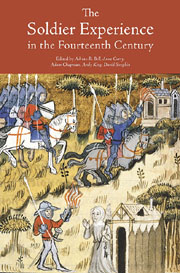Book contents
- Frontmatter
- Contents
- List of Contributors
- List of Abbreviations
- Introduction
- 1 Military Service and the Dynamics of Recruitment in Fourteenth-Century England
- 2 Total War in the Middle Ages? The Contribution of English Landed Society to the Wars of Edward I and Edward II
- 3 A Warlike People? Gentry Enthusiasm for Edward I's Scottish Campaigns, 1296–1307
- 4 Edward I's Centurions: Professional Soldiers in an Era of Militia Armies
- 5 Who's afraid of the Big Bad Bruce? Balliol Scots and ‘English Scots’ during the Second Scottish War of Independence
- 6 Rebels, Uchelwyr and Parvenus: Welsh Knights in the Fourteenth Century
- 7 Breton Soldiers from the Battle of the Thirty (26 March 1351) to Nicopolis (25 September 1396)
- 8 Towards a Rehabilitation of Froissart's Credibility: The Non Fictitious Bascot de Mauléon
- 9 The English Reversal of Fortunes in the 1370s and the Experience of Prisoners of War
- 10 The Soldier, ‘hadde he riden, no man ferre’
- Index
- Warfare in History
7 - Breton Soldiers from the Battle of the Thirty (26 March 1351) to Nicopolis (25 September 1396)
Published online by Cambridge University Press: 05 February 2013
- Frontmatter
- Contents
- List of Contributors
- List of Abbreviations
- Introduction
- 1 Military Service and the Dynamics of Recruitment in Fourteenth-Century England
- 2 Total War in the Middle Ages? The Contribution of English Landed Society to the Wars of Edward I and Edward II
- 3 A Warlike People? Gentry Enthusiasm for Edward I's Scottish Campaigns, 1296–1307
- 4 Edward I's Centurions: Professional Soldiers in an Era of Militia Armies
- 5 Who's afraid of the Big Bad Bruce? Balliol Scots and ‘English Scots’ during the Second Scottish War of Independence
- 6 Rebels, Uchelwyr and Parvenus: Welsh Knights in the Fourteenth Century
- 7 Breton Soldiers from the Battle of the Thirty (26 March 1351) to Nicopolis (25 September 1396)
- 8 Towards a Rehabilitation of Froissart's Credibility: The Non Fictitious Bascot de Mauléon
- 9 The English Reversal of Fortunes in the 1370s and the Experience of Prisoners of War
- 10 The Soldier, ‘hadde he riden, no man ferre’
- Index
- Warfare in History
Summary
In Thomas Hardy's Tess of the d'Urbervilles, towards the end of her tragic life the eponymous heroine enters for the first time the church in which her distant forbears were buried. They included ‘Sir Pagan d'Urberville, that renowned knight who came from Normandy with William the Conqueror, as appears by the Battle Abbey Roll’. Contemplating the mournful sight of tombs ‘canopied, altar-shaped, and plain; their carvings being defaced and broken; their brasses torn from the matrices, the rivet holes remaining like martin-holes in a sandcliff’, she was forcibly reminded ‘that her people were socially extinct’. In Roman Polanski's film Tess (1979), with the delectable Nastassja Kinski in the starring role, this scene is played out against a backdrop of the authentic fourteenth-century tombs of the famous Breton knightly dynasty of Beaumanoir in the abbey of St-Magloire de Léhon, just outside Dinan. Among them is that of the family's most celebrated warrior, Jean (IV) de Beaumanoir, captain of Josselin. On 26 March 1351 he led thirty fellow countrymen to victory against a similar number of English, Breton and German knights and esquires in the Battle of the Thirty, a bloody chivalric episode which cost the lives of a quarter or more of the sixty-two who took part. Feeling thirsty during a brief pause in the fighting, Beaumanoir was famously advised by a companion, ‘Boy ton sang, Beaumanoir; ta soiff te passera’, ‘Drink your blood, Beaumanoir, your thirst will pass’, according to a near-contemporary poetic account that ensured this minor skirmish passed quickly into enduring legend.
- Type
- Chapter
- Information
- The Soldier Experience in the Fourteenth Centur , pp. 157 - 174Publisher: Boydell & BrewerPrint publication year: 2011



